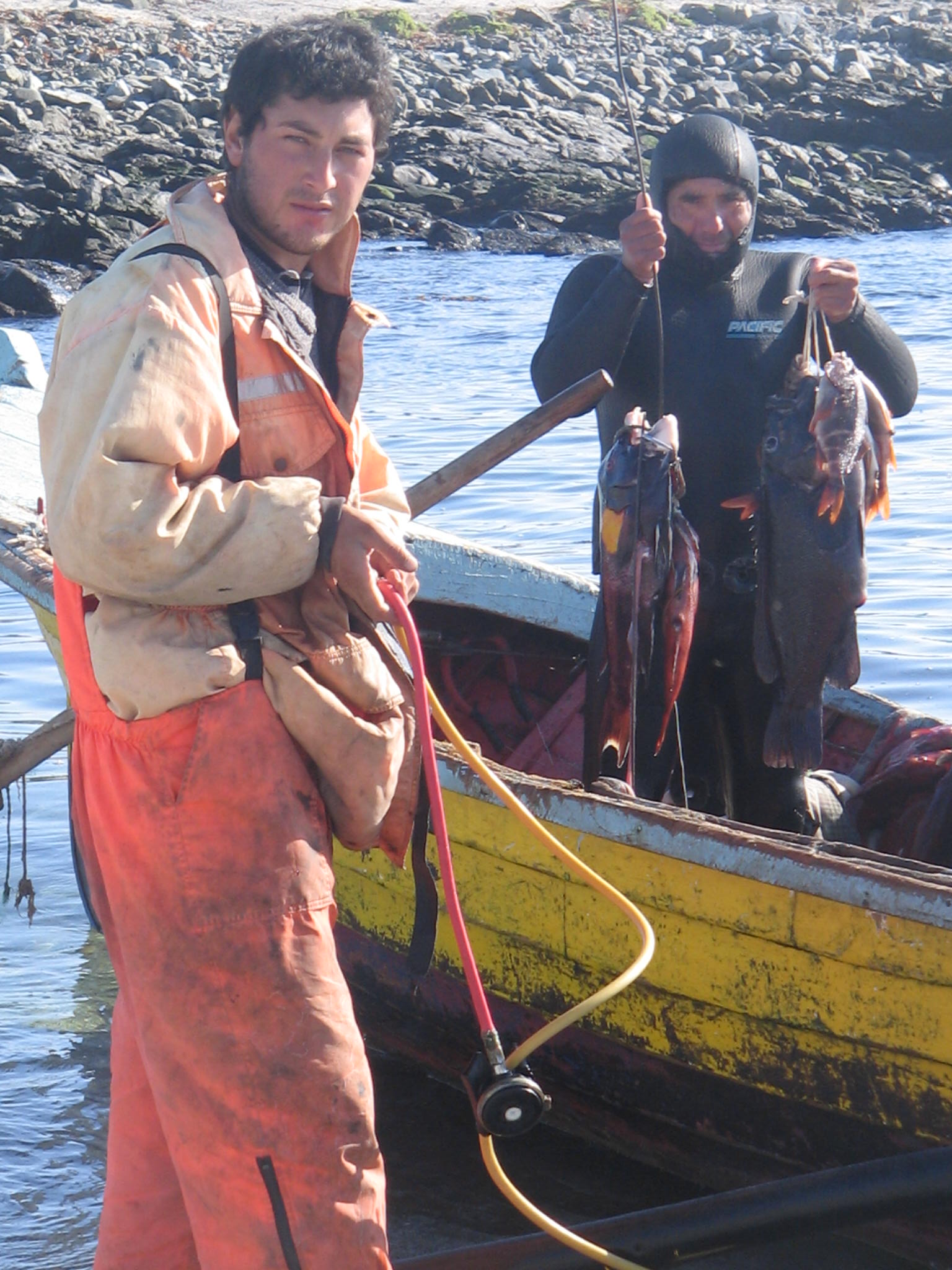Field Talk: Local spearfishing stories tell of fish depletion in Chile
 Historically, spearfishing involved a diver, a harpoon (or spear or trident) and access to an abundant source of fish. However, it has evolved over the centuries—especially within the last few decades—to include boats, masks, snorkeling gear, scuba tanks, wet suits and even spearguns. The modernization of equipment means divers are able to stay underwater for hours and fire mechanically propelled spears at faster rates than a person is able to throw. The result, in theory, is a more fruitful catch.
Historically, spearfishing involved a diver, a harpoon (or spear or trident) and access to an abundant source of fish. However, it has evolved over the centuries—especially within the last few decades—to include boats, masks, snorkeling gear, scuba tanks, wet suits and even spearguns. The modernization of equipment means divers are able to stay underwater for hours and fire mechanically propelled spears at faster rates than a person is able to throw. The result, in theory, is a more fruitful catch.
However, Natalio Godoy from the Pontificia Universidad Católica de Chile and colleagues found that the spearfishers’ catches are becoming less diverse and abundant in the temperate reefs in northern and central Chile. The result, as they suggest in a recent study published in Ecological Applications, is likely due in part to the spearfishing activities themselves.
Godoy and colleagues used several methods to obtain information on the state of reef fish communities in Chile since records of spearfishing activities, and landing records specific to certain regions, are not required by the government. Therefore, the researchers examined data from nation-wide official landing records, the catch from the top 20 divers in the 1971 and 2004 world spearfishing championships and the perceptions of local spearfishers.
 They found that the average mass of reef fish captured decreased, the percentage of discarded fish decreased and the total number of species caught decreased drastically in the 30 year span between championships. The interviews, on the other hand, contributed an even greater understanding
They found that the average mass of reef fish captured decreased, the percentage of discarded fish decreased and the total number of species caught decreased drastically in the 30 year span between championships. The interviews, on the other hand, contributed an even greater understanding
of the status of the fisheries: Divers reported that they were catching, and local markets were accepting, species of fish that were not consumed just 10-15 years ago. Raul Choque—Chilean snorkeling speargun world champion in 1971—described this shift in the study: “Before 1985, the main target species were large carnivore rocky fish [like Graus nigra or Semicossyphus darwini]; however today, we catch anything, even Jerguilla [herbivorous reef fish], which no one used to eat 10 years ago because of its bad taste.”
Choque’s quote is evidence of both the lack of management and the decline in catch diversity seen in Chile in the last couple of decades. As Stefan Gelcich, one of the co-authors, explained in a Field Talk podcast interview, “There is less catch available, so the whole market has shifted in a way. These local market [are selling] herbivore species [now],” he said. “And this has changed in not that long [of a] time. When we were speargun diving at university with [Godoy], no one used to eat Jerguilla, and that was only…10 or 15 years ago. So this change has been quite fast in terms of composition of the catch.”
The authors recommend, both in the paper and in the interview, several policy changes that they believe need to occur soon to reestablish the fisheries. Godoy outlined the specifics:
“One of the major limitations on regulating spearfishing is that the official fishery data are rather poor. Evidence suggests that in these cases the development of fishery management policy options requires the combination of multiple sources of information in order to understand the historical status and dynamics of fisheries. Our study shows that unregulated spearfishing has depleted reef fishes in temperate near-shore ecosystems along part of the Chilean coast and has also caused shifts in the composition of catches over time, thus signaling a spearfishing reef fish crisis.
Hopefully [this is] a prerequisite for initiating policy discussions aimed at the sustainable management of fisheries. These policies would include strong regulations on hookah diving [diving with compressed air from a boat], reproductive period bans and size regulations. Additionally, the use of [territorial use rights in fisheries] (TURFs) provides a fundamental building block to begin developing these initiatives.”
The authors said in the interview that the researchers are not recommending a complete ban on spearfishing activities all together. Their goal is to regulate the activities so there is a more stable population for local fishers to use as sustenance. Co-author Juan Carlos Castilla explained:
“You have to remember that in many cases this activity is done on a sustainable basis for the people who live in this area. So, it’s not for the big markets around the world—it’s not for Japan or Washington or New York, whatever—it’s local subsistence for the fishers.”